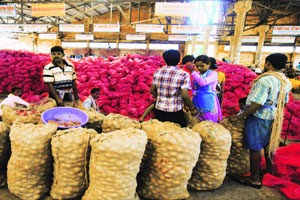 |
| Photo Source: The Indian Express |
Over the years Indian
economy has changed both in terms of its structure and outlook. The sectoral
changes have become broader and continue to expand in terms of output
generations. More than half of India’s population still relies on agriculture
as its main source of income for their living. During the last decade, there
has been a record production of foodgrains in the country.
In the so called reform
era, the outlook of industry and services sector have been seen with considerable
attention to re-structure or to move away from traditional way of governing
them. At the same time, the agriculture sector is continued to be seen from outside
of any attempt to initiate or unleash the potential structural reforms. More
than a decade ago, Dr.Y.V.Reddy said that “There is some merit in the argument
that the reform process has bypassed agriculture so far and that this is best illustrated
by the co-existence of segmented and overregulated domestic markets with liberalised
export–import regime in agricultural commodities.” This he said in 2001 and we
are now in 2014. More than a decade has been bypassed yet again and this situation
still continues.
The time has come now
that some of the extremely crucial aspects of the agriculture sector have to be
recognized and need to be addressed systemically. Dr. Reddy stressed that “the
agenda for reforms virtually encompasses a thorough change in mindset and
overhaul of legal and institutional mechanisms to enable a growing, healthy and
efficient agriculture sector.” The issues and challenges faced by the Indian
agriculture marketing are enormous and needs changes through institutional reforms.
The domestic market regulations in agriculture is an important one such issue which
merits for structural reforms. To be more specific, there is an urgency to
re-boot the State’s institutional delivery mechanism for completing the reforms
already initiated in the Model Agriculture Produce Marketing Committee (Development
and Regulation) (APMC) Act, 2003. The APMC Act was designed to focus on
protecting farmers from the vagaries of the market, mainly to ensure
remunerative prices for the farmers.
The present agriculture
marketing regulatory mechanism involves licensing and control on marketing,
storage; creation of facilitating centres in the form of regulated markets;
encouraging co-operative marketing; etc. The key issues are information
asymmetry, lack of transparency in price discovery and collusive behaviour
among distribution agents are common problems in our agricultural markets which
have prevented competition to existing licensees. One of the main issues is
that there is a large difference between the prices at retail level and those
at wholesale level due to multiple intermediaries and high taxes ranging from
13% to 15.5% advalorem apart from other Market Charges which need to be
rationalized.
In fact, there is a
classic case, the delisting of some of the essential (perishable) commodities
which are at present part of the APMC Act needs to be removed. The Act makes it
mandatory for farmers to sell their produce only to licensed merchants at
mandis set up by state agriculture marketing boards. According to a recent report
by ICRIER on the food processing industry, about 15% to 25% of the total agriculture
produce sold through the APMC route gets wasted due to multiple intermediaries
and poor quality of mandi infrastructure.
In order to bring structural
and institutional reforms in the agriculture sector the model Agricultural
Produce Marketing (Development and Regulation) (APMC) Act was passed in the
Parliament in 2003; the Act’s Rule has been implemented since 2007. The Model
Act, inter-alia, provides for direct marketing, contract farming, establishment
of markets in private and cooperative sectors, etc. Agriculture market reforms
at the State level essentially provide farmers an alternative competitive
marketing channel for transaction of their agricultural produce at remunerative
prices.
Hence, all the State/UT
governments have been urged to bring amendments/reforms in their own APMC Acts.
The process of market reforms has been initiated by several states through
either amendments or completely repealing the Act. So far, 16 States (Andhra
Pradesh, Arunachal Pradesh, Assam, Goa, Gujarat, Himachal Pradesh, Jharkhand, Karnataka, Maharashtra, Mizoram,
Nagaland, Odisha, Rajasthan, Sikkim, Tripura and Uttarakhand) have amended their respective APMC Acts. Bihar has
repealed its APMC Act in 2006. Other States have either done reforms partially
(MP, Chhattisgarh, Haryana, Punjab & Delhi) or initiated administrative
actions (UP, J&K, and WB. etc.). So far, 9 States have amended their APMC
Rules in line with the Union government.
Seven Congress-ruled
States have amended their respective APMC Act in line with the model Act of the
Union government. On 27th December, 2013, the Vice-President of
Congress Party had discussed the possibility of bringing urgent reforms in the
APMC Act with the 12 Congress-ruled States including Manipur, Mizoram, Assam,
Karnataka, Andhra Pradesh, Haryana, Himachal Pradesh, Uttarakhand, Maharashtra,
Arunachal Pradesh, Kerala and Mizoram. The specific reforms- it seems- they all
agreed was delisting of fruits and vegetables from the APMC Act. By January 15,
2014, 5 Congress-ruled States (Uttarakhand, Assam, Arunachal Pradesh, Meghalaya
and Haryana) have delisted the two items (fruits and vegetables) from the APMC
Act. According to Vice-President the delisting will eliminate these licensed
merchants or middlemen who raise the prices for profits.
According to ICRIER Professor
Arpita Mukerjee, the “Delisting of fruit and vegetables from the APMC Act is a
positive step as only 7 per cent of the total fruit and vegetables sold are
through the mandis. Even though organised retailers could buy directly from the
farmers, yet they had to pay the mandi charge. The delisting will benefit
organised retailers as also food processing firms.”
However, even after all
the initiatives being taken, there have been various issues which have been
quite persistent in the history. It is only hoped that the issues get addressed
in coming years.
B.Chandrasekaran
and Shruti Issar

No comments:
Post a Comment